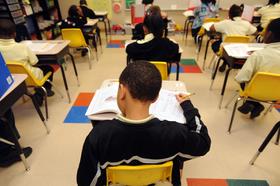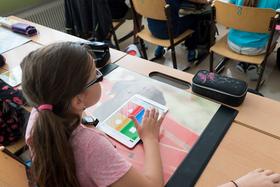For the 2025 school year, there are 2 public high schools serving 336 students in Baboquivari Unified School District #40 (4412). This district's average high testing ranking is 1/10, which is in the bottom 50% of public high schools in Arizona.
Public High Schools in Baboquivari Unified School District #40 (4412) have an average math proficiency score of 10% (versus the Arizona public high school average of 35%), and reading proficiency score of 10% (versus the 45% statewide average).
Public High School in Baboquivari Unified School District #40 (4412) have a Graduation Rate of 52%, which is less than the Arizona average of 78%.
The school with highest graduation rate is Baboquivari High School, with 75-79% graduation rate. Read more about public school graduation rate statistics in Arizona or national school graduation rate statistics.
Minority enrollment is 100% of the student body (majority American Indian), which is more than the Arizona public high school average of 65% (majority Hispanic).
Overview
This School District
This State (AZ)
# Schools
6 Schools
953 Schools
# Students
1,057 Students
441,181 Students
# Teachers
73 Teachers
15,905 Teachers
Student-Teacher Ratio
14:1
14:1
Student By Grade
District Rank
Baboquivari Unified School District #40 (4412), which is ranked within the bottom 50% of all 603 school districts in Arizona (based off of combined math and reading proficiency testing data) for the 2022-2023 school year.
The school district's graduation rate of 52% has decreased from 55-59% over five school years.
Overall District Rank
#592 out of 618 school districts
(Bottom 50%)
(Bottom 50%)
Math Test Scores (% Proficient)
4%
34%
Reading/Language Arts Test Scores (% Proficient)
7%
40%
Science Test Scores (% Proficient)
≤5%
24%
Graduation Rate
52%
77%
Students by Ethnicity:
Diversity Score
0.19
0.66
% American Indian
90%
5%
% Asian
1%
4%
% Hispanic
9%
46%
% Black
n/a
6%
% White
n/a
35%
% Hawaiian
n/a
n/a
% Two or more races
n/a
4%
All Ethnic Groups
District Revenue and Spending
The revenue/student of $20,249 is higher than the state median of $11,421. The school district revenue/student has declined by 9% over four school years.
The school district's spending/student of $20,071 is higher than the state median of $11,323. The school district spending/student has declined by 9% over four school years.
Total Revenue
$21 MM
$12,837 MM
Spending
$21 MM
$12,727 MM
Revenue / Student
$20,249
$11,421
Spending / Student
$20,071
$11,323
Best Baboquivari Unified School District #40 (4412) Public High Schools (2025)
School
(Math and Reading Proficiency)
(Math and Reading Proficiency)
Location
Quick Facts
Rank: #11.
Alternative High School (Indian Oasis High School)
Alternative School
(Math: <50% | Reading: <50% )
Rank:
Rank:
7/
Top 50%10
111 Main Street
Sells, AZ 85634
(520) 719-1260
Sells, AZ 85634
(520) 719-1260
Gr: 9-12 | 95 students Student-teacher ratio: 19:1
Rank: #22.
Baboquivari High School
(Math: ≤10% | Reading: ≤10%)
Rank:
Rank:
1/
Bottom 50%10
Indian Route 19, Mile Post 19.
Sells, AZ 85634
(520) 719-1250
Sells, AZ 85634
(520) 719-1250
Gr: 9-12 | 241 students Student-teacher ratio: 15:1
Recent Articles

Why Single-Sex Public Schools are Growing in Popularity
This article examines the growing trend of single-sex public schools in the United States. It explores the potential benefits, research findings, and controversies surrounding gender-specific education, as well as the factors driving its increasing popularity among parents and educators.

When Teachers Cheat: The Standardized Test Controversies
Teachers across the country are being accused of cheating on standardized tests, using erasers to conveniently change their students’ answers. However, are these teachers driven to cheat because the funding system is flawed?

When Field Trips Turn Deadly: Who is Responsible?
Recent deaths during field trips have parents and school officials questioning the safety of these excursions. Learn about these tragedies and what parameters should be in place to ensure a safe field trip.





